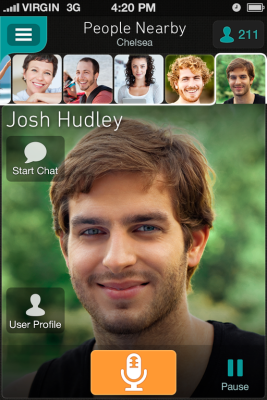Talkbits, a Russian startup making a social-discovery voice-based mobile messaging app tied to where you’re using it, has attracted $2 million in funding from Russia’s Runa Capital early stage VC firm. The startup is demoing its forthcoming Android and iOS apps for the first time at the Dublin Web Summit this week, but it remains in a closed alpha with 150 test users kicking its tyres until it starts opening invites to the public. It plans to roll out city by city — targeting London and Moscow for starters.
The idea behind the app is to use voice messages as a way to explore a mobile user’s immediate location. Users can leave geotagged voice messages for others to discover, or ask questions that others in the area might be able to answer. The app also supports direct voice messaging between friends and private and public topic-related discussion groups.
“The app makes it simple for people to jump in on conversations going on around them,” explains Olga Steidl, CEO of talkbits, in a statement. “You can discover interesting people and things at places around you. Listen to the latest news of people and interests you love. Or message friends directly through voice.”
The $2 million is Talkbit’s first funding round — the startup had been developing the app without any backing before connecting with Runa Capital. Talkbit founder, Andrei Vasilevsky, previously worked on the mobile team at Russian search company Yandex — along with Steidl, who was VP of mobile ecosystems there, and prior to that VP Marketing at mobile developer SPB Software (which was acquired by Yandex).
Steidl tells me one use-case the company sees for the app is students attending the same university seeking time-sensitive answers to questions such as ‘has the lecture started yet?’. Another use-case that’s proving popular with testers is for drivers stuck in traffic jams to ask for alternative routes. In that scenario the hands-free focus on the app — using voice, rather than text — comes into its own, says Steidl.
In future the app will support private voice chats for particular groups — as well as public channels — but the initial launch won’t include the private chat function. The startup’s early focus will be on building out a critical mass of users in each city, says Steidl — with invites for more people to join the app due to go out on November 1.
In terms of business model, she says there are several possibilities it’s looking at — including in-app purchases to sell virtual goods, and working with mobile operators to offer premium services — such as a curated channel with a specific set of APIs.

